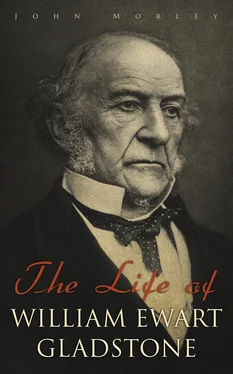'Never since the time when I first knew you,' Hallam wrote to Gladstone (June 23, 1830), 'have I ceased to love and respect your character ... It will be my proudest thought that I may henceforth act worthily of their affection who, like yourself, have influenced my mind for good in the earliest season of its development. Circumstance, my dear Gladstone, has indeed separated our paths, but it can never do away with what has been. The stamp of each of our minds is on the other. Many a habit of thought in each is modified, many a feeling is associated, which never would have existed in that combination, had it not been for the old familiar days when we lived together.'
In the summer of 1827 Hallam quitted Eton for the journey to Italy that set so important a mark on his literary growth, and he bade his friend farewell in words of characteristic affection. 'Perhaps you will pardon my doing by writing what I hardly dare trust myself to do by words. I received your superb Burke yesterday; and hope to find it a memorial of past and a pledge for future friendship through both our lives. It is perhaps rather bold in me to ask a favour immediately on acknowledging so great a one; but you would please me, and oblige me greatly, if you will accept this copy of my father's book. It may serve when I am separated from you, to remind you of one, whose warmest pleasure it will always be to subscribe himself, Your most faithful friend, A. H. H.'
A few entries from the schoolboy's diary may serve to bring the daily scene before us, and show what his life was like:—
October 3, 1826 .—Holiday. Walk with Hallam. Wrote over theme. Read Clarendon. Wrote speech for Saturday week. Poor enough. Did punishment set by Keate to all the fifth form for being late in church.
October 6. —Fin. second Olympiad of Pindar.... Clarendon. Did an abstract of about 100 pages. Wrote speech for to-morrow in favour of Cæsar.
November 13 .—Play. Breakfast with Hallam. Read a little Clarendon. Read over tenth Satire of Juvenal and read the fifth, making quotations to it and some other places. Did a few verses.
November 14 .—Holiday. Wrote over theme. Did verses. Walked with Hallam and Doyle. Read papers and debates.... Read 200 lines of Trachiniae . A little Gil Blas in French, and a little Clarendon.
November 18 .—Play. Read papers, etc. Finished Blair's Dissertation on Ossian . Finished Trachiniae . Did 3 props. of Euclid. Question: Was deposition of Richard II. justifiable? Voted no. Good debate. Finished the delightful oration Pro Milone .
November 21 .—Holiday.... Part of article in Edinburgh Review on Icon Basilike . Read Herodotus, Clarendon. Did 3 props. Scrambling and leaping expedition with Hallam, Doyle, and Gaskell.
November 30 .—Holiday. Read Herodotus. Breakfasted with Gaskell. He and Hallam drank wine with me after 4. Walked with Hallam. Did verses. Finished first book of Euclid. Read a little Charles XII .
February 27, 1827 .—Holiday. Dressed (knee-breeches, etc.) and went into school with Selwyn. Found myself not at all in a funk, and went through my performance with tolerable comfort. Durnford followed me, then Selwyn, who spoke well. Horrors of speaking chiefly in the name.
March 20 .—My father has lost his seat, and Berwick a representative ten times too good for it. Wrote to my father, no longer M.P.; when we have forgotten the manner, the matter is not so bad.
March 24 .—Half-holiday. Play and learning it. Walked with Hallam, read papers. Hallam drank wine with me after dinner. Finished 8th vol. of Gibbon; read account of Palmyra in second volume; did more verses on it. Much jaw about nothing at Society, and absurd violence.
May 31 .—Finished iambics. Wrote over for tutor. Played cricket in the Upper Club, and had tea in poet's walk [an entry repeated this summer].
June 26 .—Wrote over theme. Read Iphigenie . Called up in Homer. Sculled Hallam to Surly after 6. Went to see a cricket match after 4.
FAREWELL TO ETON
Gladstone's farewell to Eton came with Christmas (1827). He writes to his sister his last Etonian letter (December 2) before departure, and 'melancholy that departure is.' On the day before, he had made his valedictory speech to the Society, and the empty shelves and dismantled walls, the table strewn with papers, the books packed away in their boxes, have the effect of 'mingling in one lengthened mass all the boyish hopes and solicitudes and pleasures' of his Eton life. 'I have long ago made up my mind that I have of late been enjoying what will in all probability be, as far as my own individual case is concerned, the happiest years of my life. And they have fled! From these few facts do we not draw a train of reflections awfully important in their nature and extremely powerful in their impression on the mind?'
DR. KEATE
Two reminiscences of Eton always gave him, and those who listened to him, much diversion whenever chance brought them to his mind, and he has set them down in an autobiographic fragment, for which this is the place:—
To Dr. Keate nature had accorded a stature of only about five feet, or say five feet one; but by costume, voice, manner (including a little swagger), and character he made himself in every way the capital figure on the Eton stage, and his departure marked, I imagine, the departure of the old race of English public school masters, as the name of Dr. Busby seems to mark its introduction. In connection with his name I shall give two anecdotes separated by a considerable interval of years. About the year 1820, the eloquence of Dr. Edward Irving drew crowds to his church in London, which was presbyterian. It required careful previous arrangements to secure comfortable accommodation. The preacher was solemn, majestic (notwithstanding the squint), and impressive; carrying all the appearance of devoted earnestness. My father had on a certain occasion, when I was still a small Eton boy, taken time by the forelock, and secured the use of a convenient pew in the first rank of the gallery. From this elevated situation we surveyed at ease and leisure the struggling crowds below. The crush was everywhere great, but greatest of all in the centre aisle. Here the mass of human beings, mercilessly compressed, swayed continually backwards and forwards. There was I, looking down with infinite complacency and satisfaction from this honourable vantage ground upon the floor of the church, filled and packed as one of our public meetings is, with people standing and pushing. What was my emotion, my joy, my exultation, when I espied among this humiliated mass, struggling and buffeted—whom but Keate! Keate the master of our existence, the tyrant of our days! Pure, unalloyed, unadulterated rapture! Such a περιπέτεια, such a reversal of human conditions of being, as that now exhibited between the Eton lower boy uplifted to the luxurious gallery pew, and the head-master of Eton, whom I was accustomed to see in the roomy deck of the upper school with vacant space and terror all around him, it must be hard for any one to conceive, except the two who were the subjects of it. Never, never, have I forgotten that moment. 32
I will now, after the manner of novelists, ask my reader to effect along with me, a transition of some eighteen years, and to witness another, and if not a more complete yet a worthier, turning of the tables. In the year 1841 there was a very special Eton dinner held in Willis's Rooms to commemorate the fourth centenary of the ancient school. Lord Morpeth, afterwards Lord Carlisle, was in the chair. On his right, not far off him, was Dr. Keate, to whom I chanced to have a seat almost immediately opposite. In those days, at public dinners, cheering was marked by gradations. As the Queen was suspected of sympathy with the liberal government of Lord Melbourne which advised her, the toast of the sovereign was naturally received with a moderate amount of acclamation, decently and thriftily doled out. On the other hand the Queen Dowager either was, or was believed to be, conservative; and her health consequently figured as the toast of the evening, and drew forth, as a matter of course, by far its loudest acclamation. So much was routine; and we went through it as usual. But the real toast of the evening was yet to come. I suppose it to be beyond doubt that of the assembled company the vastly preponderating majority had been under his sway at Eton; and if, when in that condition, any one of them had been asked how he liked Dr. Keate, he would beyond question have answered, 'Keate? Oh, I hate him.' It is equally beyond doubt that to the persons of the whole of them, with the rarest exceptions, it had been the ease of Dr. Keate to administer the salutary correction of the birch. But upon this occasion, when his name had been announced the scene was indescribable. Queen and Queen Dowager alike vanished into insignificance. The roar of cheering had a beginning, but never knew satiety or end. Like the huge waves at Biarritz, the floods of cheering continually recommenced; the whole process was such that we seemed all to have lost our self-possession and to be hardly able to keep our seats. When at length it became possible Keate rose: that is to say, his head was projected slightly over the heads of his two neighbours. He struggled to speak; I will not say I heard every syllable, for there were no syllables; speak he could not. He tried in vain to mumble a word or two, but wholly failed, recommenced the vain struggle and sat down. It was certainly one of the most moving spectacles that in my whole life I have witnessed.
Читать дальше









![William Frith - John Leech, His Life and Work. Vol. 1 [of 2]](/books/747171/william-frith-john-leech-his-life-and-work-vol-thumb.webp)


![William Frith - John Leech, His Life and Work, Vol. 2 [of 2]](/books/748201/william-frith-john-leech-his-life-and-work-vol-thumb.webp)